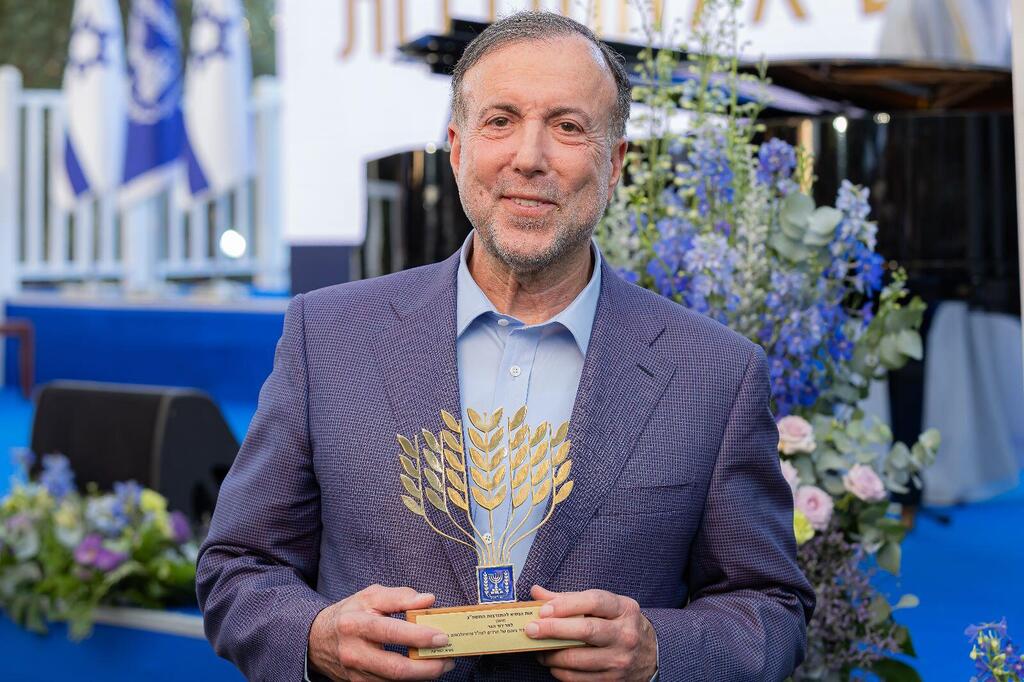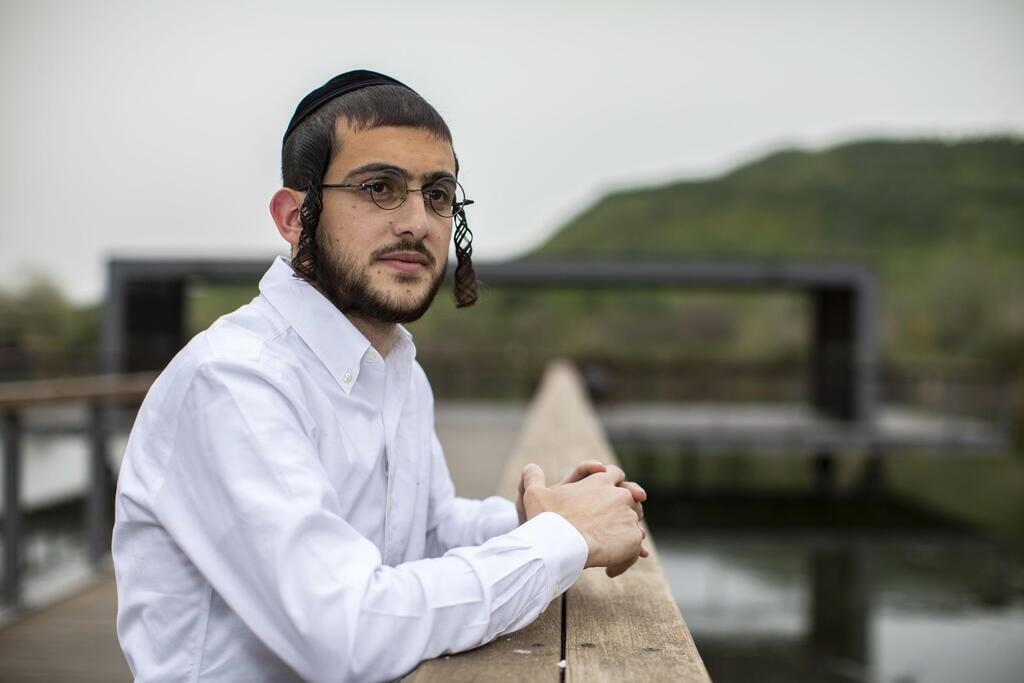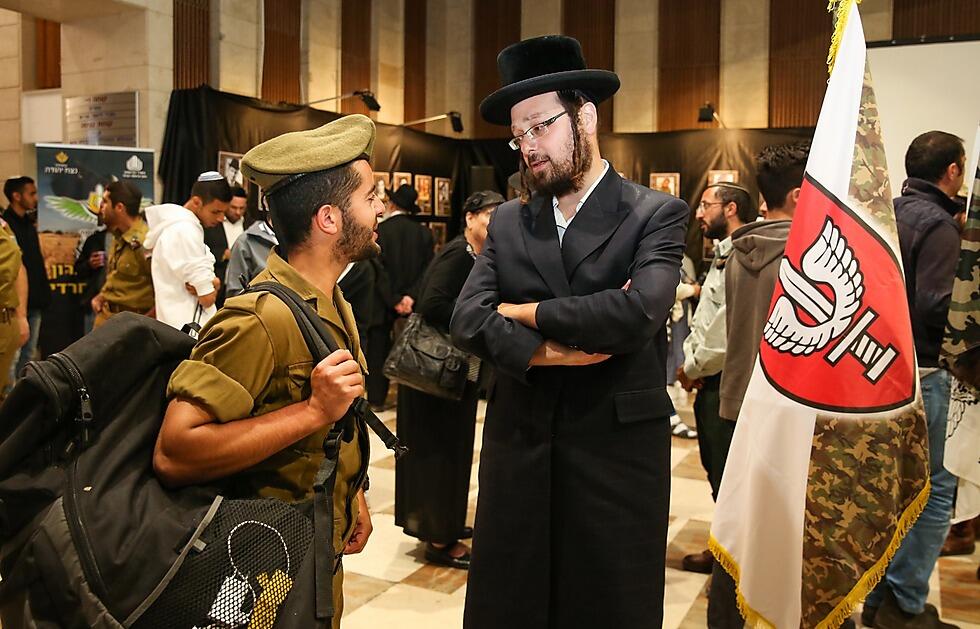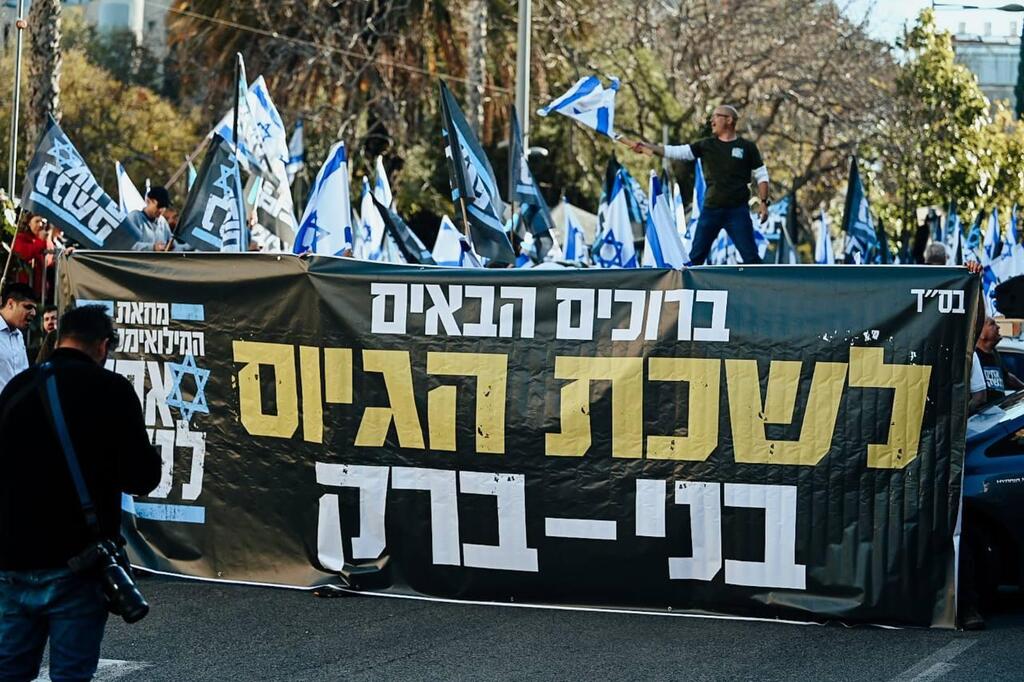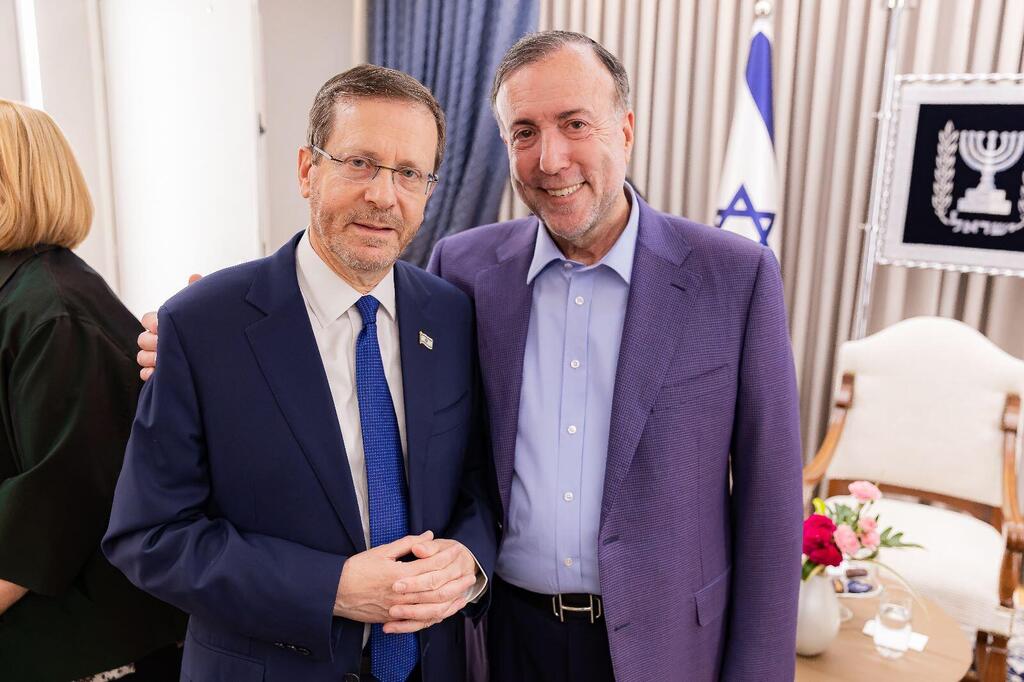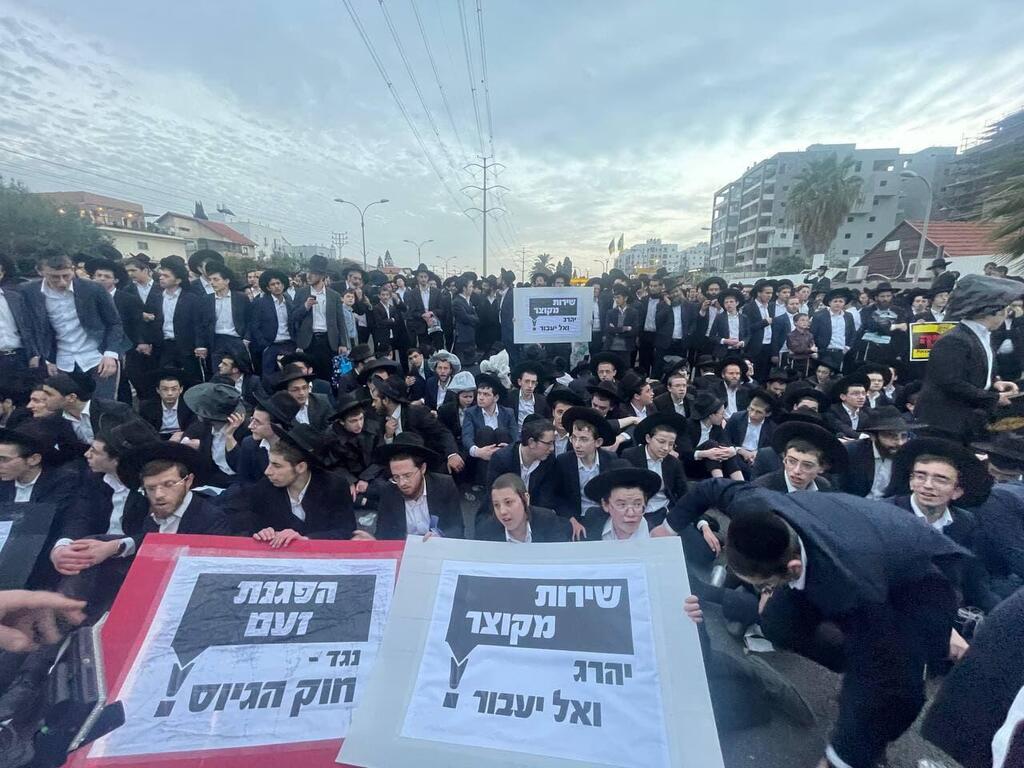When businessman David Hager saw the footage of Yisrael Yonatan Hirsch, an ultra-Orthodox Jew, being harassed by a passenger on a bus simply because of his religious appearance, he was appalled.
More stories:
"I believe we may be facing the destruction of our society," he says with anguish. "In recent weeks, this is what has been weighing heavily on my mind. In our history, there has been baseless hatred before. Forget the fact that he served more than her, as a captain in the Haruv Paratrooper Unit. Let's say he didn't serve at all. Is he a ‘deviant' just because he wears a kippah and side curls? If this happened in the United States, he would immediately sue her in court. It is unabashed antisemitism in its ugliest form."
For over 20 years, Hager has donated millions to the cause of ultra-Orthodox enlistment in the IDF, particularly to the organization Netzah Yehuda, of which he is a board member.
Last month, he received official recognition for his efforts when he was awarded the Presidential Award for Volunteerism. Hager, a modern Orthodox Jew who divides his time between Los Angeles and Jerusalem, offers his own plan for the enlistment law, one of the issues that threaten the stability of the coalition and stir Israeli society.
He opposes the Finance Ministry's demand to lower the exemption age for Haredi men to 21 but believes that the Defense Ministry should closely monitor the yeshivas and ensure that those receiving exemptions are genuinely studying with dedication.
"The main question is at what age do you get full exemption and can pursue academic studies and work. The Finance Ministry wants them to enter the workforce as early as possible, claiming it will benefit the economy. The Defense Ministry is willing to lower the exemption age to 23, but not beyond that, for the simple reason that if you lower it to 21, about a thousand Haredim who enlist each year will no longer do so," he explains.
"I argue that the Defense Ministry is right, but for a completely different reason: Before an ultra-Orthodox individual gets married, it is unlikely that they will work because once they are already employed, they are considered second class. If the average age of marriage is 22, they will only start working at the age of 23-24. Besides the fact that it will impact the recruitment of Haredi combat soldiers and create complete inequality, there is no reason to get into this controversy if it doesn't genuinely lead anyone to work."
"We need another 900 Haredim to enlist each year. That's it. Roughly double the current number... In Netzah Yehuda, we succeed in enlisting Haredim and keeping them the same from a religious perspective, some even strengthening their observance... But it is impossible to enlist all the Haredim, the army will collapse"
So, you have no aspiration to enlist all the Haredim?
"It is impossible to enlist more than two Haredi battalions beyond what already exists for a simple reason: It requires creating a camp within a camp, and it is a major headache. Each battalion needs to send soldiers to courses, and there are plenty of women in those courses. How do you overcome this issue? By the way, on their induction day, they remove all the women from the recruits' chain. With two or three battalions, there will still be room for training, but more than that is simply impossible."
Where do you ultimately aim to grow?
"We need another 900 Haredim to enlist each year. That's it. Roughly double the current number. You cannot recruit Haredim under your conditions. That's what the Haredi public fears, that they want to change them. In Netzah Yehuda, we succeed in enlisting Haredim and keeping them the same from a religious perspective, some even strengthening their observance. We have rabbis who accompany them during their service. But it is impossible to enlist all the Haredim, the army will collapse. Let's be realistic."
So, is the term ‘The People's Army’ nothing more than an empty slogan?
"Not empty, but it is not always true. How many desk jobs are there in the army? Tens of thousands. You can't compare combat soldiers in elite units to soldiers who go home at five. Even Israeli Arabs, they understand that they can't enlist for a simple reason. The same goes for exceptional athletes. Is there equality in the burden? No, but since they have a special situation, they have different conditions."
However, he argues that there is a need for an addition to the conscription law. "We have to define what 'Torato Umanuto' (a special arrangement that allows young men enrolled in Haredi yeshiva academies to complete their studies before their conscription) means, how many hours one needs to sit and study," he says.
8 View gallery


Hager receives citation from IDF Deputy Chief of Staff Maj. Gen. Amir Baram
(Photo: Haim Twito)
"Just as there is oversight by the Education Ministry, there should be oversight by the Defense Ministry. Inspectors from the Defense Ministry should come and check attendance. Those who were absent two or three times should receive a warning, and those who are absent for the fourth time should lose their exemption for 'Torato Umanuto' and be obligated to enlist. Yeshivas can also be warned that if a yeshiva does not meet the required attendance quota, it will lose its exemption. This will raise the level of study in yeshivas and enable the army to recruit those who are not interested in studying and work under the table."
Yonatan Hirsch, the Haredi man from the viral video that shocked many, also enlisted thanks to Hager. "His mother Nurit consulted with me when he wanted to enlist," he recalled.
"She was concerned that it would cause a stir in the yeshiva and affect his ability to find a match. I asked her: Do you think it would harm your son religiously? She said, 'Definitely not.' I asked if she thought it was good for the child, and she said, 'Yes, but I'm worried it will affect his matches.' I asked her: ‘Do you believe there is a Creator in the world?’ She answered 'Of course,' and I said to her: ‘Then let him worry about it.’ He enlisted, completed officer training with flying colors, and today he is a highly skilled prosecutor – married and a father."
The endorsement from Rabbi Ovadia Yosef
We meet on the 22nd floor of the Leonardo Plaza Hotel in the capital, where he spends his time when he is in Israel. In the lounge are displayed photos of Hager with Shimon Peres and Benjamin Netanyahu, alongside pictures of him meeting with Rabbi Aharon Shteinman and Rabbi Ovadia Yosef.
"I used to visit Rabbi Ovadia Yosef twice almost every year, and he would encourage me: Keep up, keep up with the holy work.' I asked him several times to say it publicly, but he didn't want all the rabbis to dogpile on him," he reveals.
He grew up in Tel Aviv. His father Moshe was a well-known businessman who founded the famous Artik-Kartiv ice cream factory. "I was a spoiled child who received a lot of ice cream. I used to bribe the teachers with ice lollies so I wouldn't have to return from recess," he jokes.
8 View gallery
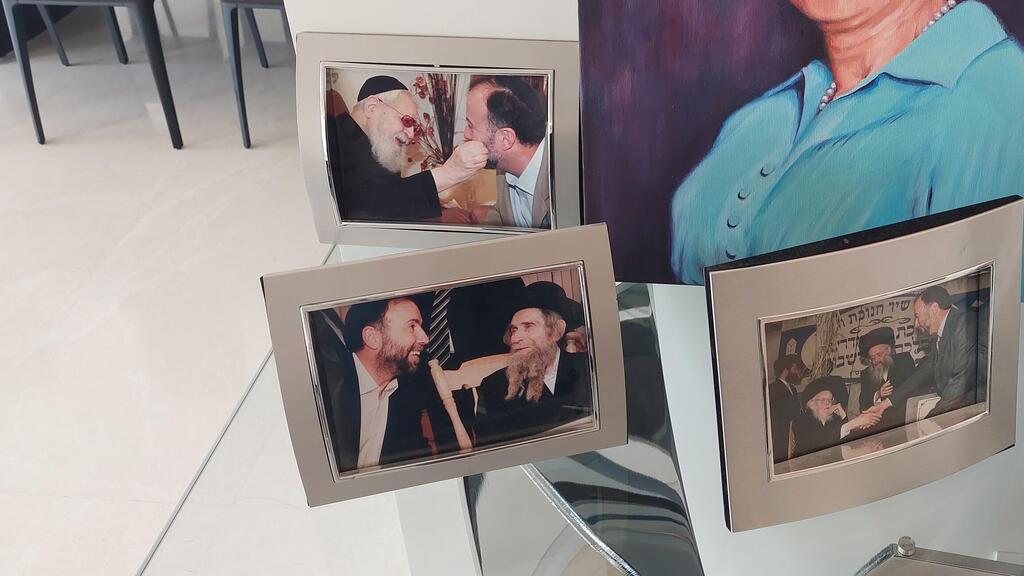

Upper left: a photo of Hager with Rabbi Ovadia Yosef; Bottom left: a photo of Hager with Rabbi Aharon Shteinman
(Photo: Shmuel Munitz)
He came to California following his wife, Jodi. Today he is a father of three and a grandfather of 18 grandchildren; his two daughters moved to Israel, while his son lives in Los Angeles. "I come from a family of admorim, from the Chassidut of Vizhnitz. Thank God, I have good friends from all sectors," he says.
Hager, who will turn 70 in the coming month, is the founder and managing partner of Hager Pacific Properties, an American real estate company specializing in the acquisition and rehabilitation of industrial buildings, shopping centers, offices and private properties.
"All my partners have learned from me that the meaning of life is not just about money but about giving. Adam Milstein is my partner, and he is one of the leading forces in the United States fighting against antisemitism and BDS," he notes.
He himself studied in a Haredi yeshiva and then decided to transfer to a hesder yeshiva and enlist in the army. "I served in the army as part of Yeshivat Kerem B'Yavneh. I decided that I couldn't live a lie, I didn't see myself sitting and studying beyond the age of 30," he recounts.
"Rabbis called my father to convince him not to allow me to go to the army, and as always, the main argument was about damaging matchmaking prospects.
"When my wife arrived in the country, they offered her all sorts of yeshiva boys, and she didn't want them because she knew they couldn't move to Los Angeles (the 'Torato Umanuto' arrangement requires them to stay in the country and study in a yeshiva). I didn't have such a problem, so in the end, precisely because I had completed military service, I found the love of my life."
The state's grave mistake
Some consider him one of the founders of Netzah Yehuda, the unit that replaced the Haredi Nahal, but Hager says that he joined the project only two years after it started. "Rabbi Yitzchak Bar Chaim and Rabbi David Fuchs, together with Lieutenant Colonel Yehuda Duvdevani, established Netzah Yehuda. The agreement was that the army would provide the Haredi soldiers with kosher food, a set study time every day and guidance from rabbis. They would serve without women on base, and in the third year, they would have the option to complete their matriculation exams or acquire a profession," he explains.
How did the Haredi street react to this? According to him, there were gradual shifts underneath the surface over the years. "In the early years, from 1999 to 2005, our rabbis were attacked - tar on the doors, late-night phone calls, demonstrations outside their homes. With proper education and positive results, most rabbis quietly started advising parents of boys who weren't studying that it would be beneficial for them to enlist,” he says.
“The army transforms a boy into a responsible, independent person. The army is good for the youth, period. Especially for youth who feel like second-class citizens, suddenly they can feel that their lives have meaning."
Over the years, additional specialized paths were added for Haredi combat soldiers - the Negev Defenders Unit in the Air Force, the Tomer Unit in the Givati Brigade, and the Haredi Paratrooper Battalion in the Paratroopers Brigade.
To understand the Haredi reluctance to serve in the military, one must go back in time, according to Hager. "In the 1950s, there was an anti-religious atmosphere in the army. In the early days of the state, Ger Hasidim and Vizhnitz Hasidim enlisted. However, the army was not built for religious individuals at all; there was immense disrespect,” he says.
"[T]hey determined that if a young man chooses not to enlist within the framework of 'Torato Umanuto', he must remain in yeshiva until an advanced age... This created a culture where the ideal is to sit and study for a lifetime... Concurrently, they also educated the girls to seek a groom who will exclusively study Torah"
“For example, they would release you two hours before Shabbat, when there was no public transportation available, and you would have to hitchhike and desecrate the Sabbath. Even in terms of kashrut, there was no consideration. So Haredi parents were not interested in sending their children to the army, and thus, the number of exemptions, starting from 400, grew until there was a coalition agreement that stated that anyone who wants exemption can receive it."
"So, the State of Israel made the blunder that we all lament: they determined that if a young man chooses not to enlist within the framework of 'Torato Umanuto', he must remain in yeshiva until an advanced age," he says. "They set the age at 32; today it's 26. This created a culture where the ideal is to sit and study for a lifetime. We were hoisted with our own petard. Concurrently, they also educated the girls to seek a groom who will exclusively study Torah. This exists only in Israel on such a scale."
The year 2013, he notes, marked a turning point in Haredi enlistment, and not for the better. He has criticism of the Yesh Atid party and its leader Yair Lapid but refrains from mentioning them by name.
"Until 2013, Haredi enlistment was on the rise. A certain party insisted on imposing criminal sanctions if the designated quotas were not met, which was impractical. If they were to arrest 200 yeshiva students, the current protests against the reform would pale in comparison to what would happen. I went to the home of that party leader and asked him why he insisted on it, telling him that it would hinder enlistment. Since then, there has been no increase in enlistment, despite the fact that the number of Haredi candidates for security service increases each year. In terms of percentages, the rate of Haredi enlistment from among the candidates has decreased."
'The Haredim are black gold'
Among his many endeavors and contributions, Hager is also involved in the Haredi technological yeshiva Derech HaChaim and Atida, an organization that assists Haredi women in integrating as civilian workers in significant roles in the IDF. Despite his efforts in favor of Haredi enlistment, he refrains from calling those who do not enlist "draft dodgers," as long as they truly dedicate themselves to study.
"I consider a draft dodger someone who wants to make his life easier. A young man who genuinely sits and studies all day is not a draft dodger in my eyes," he remarks. "Do you know how difficult it is to sit and study Gemara all day? It's not easy to be a yeshiva student. Maybe the student won't die in the tent of Torah, but these are not easy lives."
Hager believes that the effort to integrate Haredi men into the job market is of paramount importance. "The Haredim are black gold. The potential of a Haredi child to contribute to the hi-tech industry is several times greater than that of a non-Haredi child, simply because they possess a level of focus and concentration that no one else has," he argues.
"The Talmud sharpens and hones their abilities. They are not distracted by smartphones, unlike the majority of children today who struggle with attention deficit and lack of concentration. This sharpness is exactly what the hi-tech industry needs. Once we overcome the difficulties in mathematics and English and integrate the influx of talent from Russia. We can encourage core curriculum without coercion."
In general, he does not believe in coercion. "A Haredi businessman once told me that Haredim are like old furniture: you can move them, but slowly. If you move them too quickly, they will break," he recounts.
"Changes do happen, but slowly. In any case, we must embrace the Haredim. If they feel attacked, they will retreat. Apart from that, we need to recognize the positive aspects of the Haredi community, such as their focus on family, respect for parents and acts of charity. I also have criticisms of the Haredi sector, but I choose to focus on the lessons we can learn from them.”
How did you feel when you received the presidential award?
"I felt that my work was being recognized, and I'm not talking about financial investment. Investing money is very easy; you write a check and then forget about it. I invest several hours a day in the cause of Haredi enlistment, personally know the IDF generals who are involved in the project. Everyone knows that after 22 years, I understand the subject better than they do."
How do you deal with cases of soldiers whose parents have disowned them?
"There are many who have enlisted and are coping with the rupture from their parents. Netzah Yehuda NGO provides apartments for soldiers, and we support them. Our rabbis act as bridges between parents and children, with tremendous success. Thank God, Haredi parents are starting to understand that the army only does good for a child who doesn't study.
"There's one Netzah Yehuda graduate, a Belz hasid, whose father told him to take his clothes and leave the house after he decided to enlist. This young man slept on the beach for a few nights, then found a job and slept there on the table. What's beautiful is that since then, he got married to a Haredi woman, kept his side curls and eventually his parents reconciled with him and embraced him. This happens to many parents. To their credit, it can be said that as soon as they understand that this is the right step for their child, they embrace him."


